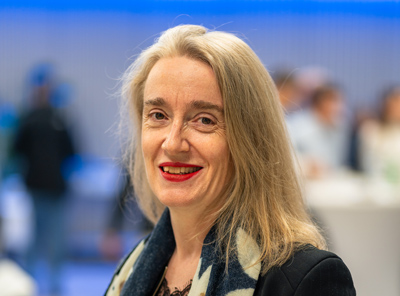How do the goals of the Paris Agreement impact SMEs? What does the "net zero" objective mean? Insights from Anne le Duc, director of the Swiss Climate Action Initiative (SCAI).
By 2050, Switzerland must not emit more greenhouse gases than can be absorbed by natural and technical reservoirs. The Swiss Climate Action Initiative (SCAI) has drawn up a guide for SMEs, in collaboration with companies of all sizes and from all sectors, so that small and medium-sized enterprises can also make an effective and efficient contribution.
Can you remind us what the goals of the Paris Agreement are?
Anne le Duc: The goal is to combat climate change by limiting global warming to below 2°C compared to pre-industrial levels, with efforts to limit it to 1.5°C. These goals were adopted during the COP21 in Paris in December 2015. The concept of "net zero" is at the heart of the commitments made by the 195 countries that signed this agreement. On the one hand, CO2 emissions must be reduced as much as possible. On the other hand, it must be possible for the remainder to be absorbed by natural and technical reservoirs.
Which companies are affected by these goals?
le Duc: All companies must commit to reducing and neutralizing CO2 emissions. Greenhouse gas emissions are divided into three categories: Scope 1 refers to an organization's direct emissions, generated, for example, by a production facility or industrial processes. Scope 2 includes emissions related to the production of electricity, heating, or steam purchased by a company. Finally, Scope 3 refers to indirect emissions that result upstream and downstream of a company's activities. Scope 3 for a bakery includes, among other things, CO2 emissions linked to flour production and transport, as well as the impact of disposing of unsold products.
What can SMEs actually do?
le Duc: Regarding Scope 1 and 2 emissions, this may involve, for example, purchasing electricity with low CO2 emissions or a fleet of electric vehicles. For scope 3, the measures depend on the economic sector concerned. Efforts to reduce emissions in this category include efficiency measures. These include, for example, optimising purchases or raw material requirements, choosing more sustainable suppliers (supplier commitment) or switching to fossil-free fuels for goods transport and business travel. For a company in the catering sector, a sensible measure would be to offer less meat on menus and increasingly favour ingredients with a low CO₂ content.
What economic benefits can companies derive from their commitment to reducing their greenhouse gas emissions?
le Duc: Mastery of sustainability-related issues is increasingly becoming a competitive advantage, for example, in the context of tenders. To meet their targets, large companies are paying increasing attention to the CO2 emissions of their suppliers, who are often SMEs. The company's stance on these issues also increasingly influences its reputation, which can impact the recruitment of younger generations, particularly sensitive to these issues.
What is the Swiss Climate Action Initiative (SCAI)?
le Duc: The platform brings together large companies, SMEs and a range of other organisations around the common goal of reducing their CO2 emissions as effectively and efficiently as possible. They discuss the central problems they face together, but also their expertise in the field and the progress they are making in a transparent manner. This is also why the Climate Cockpit was set up, in collaboration with these companies and organisations, so that they can say in a factual manner where they stand, what measures they are implementing to achieve the net zero objective and what challenges they face in achieving it.
What does the recently published Guidance for SMEs by SCAI contain?
le Duc: It is a short, practical document aimed at company management. It provides concrete information on the following questions: what does "net zero" mean? Why are the Paris climate objectives relevant to SMEs? How should targets be defined? When should external help be sought? etc. The guide also contains useful links and tips, such as how to carry out a CO2 assessment of your company.
You also organize the Swiss Green Economy Symposium (SGES), with the next edition scheduled for August 2024 in Winterthur. Who is this event for?
le Duc: Since 2013, the SGES has been Switzerland's largest conference on business and sustainable development. It brings together, in a neutral setting, companies of all sizes and from all sectors, as well as politicians, scientists and civil society. The aim is to enable participants to network, exchange winning recipes and discuss challenges critically and constructively. In September 2023, the eleventh edition of this conference brought together more than 2,000 participants. The SGES is aimed at decision-makers, implementers and innovators from business, politics, science and civil society who want to promote and implement sustainability successfully and effectively in their areas of responsibility.






